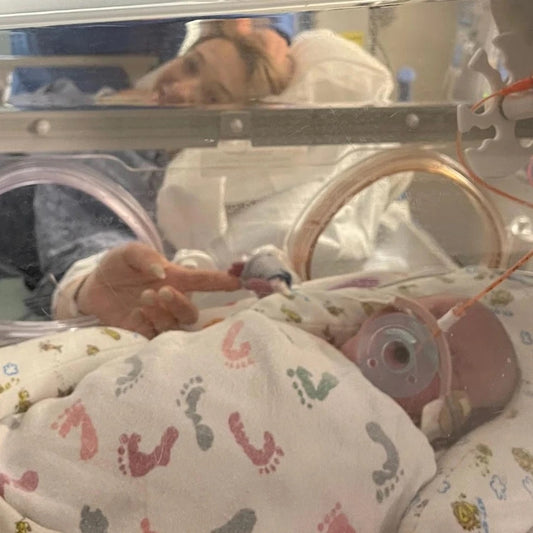Share
Why skin to skin is so much more than a simple cuddle
Priyanshu MehraGuest post by Tracy Gillet of Raised Good
Mama hold me close,
I’ve never been here before.
Mama, keep me safe
It is all new and scary to me.
Mama, it's much colder out here,
Let me share your warmth.
Mama rest me upon and let me listen
To the beat of your heart.

Photo of Tracy Gillet
Imagine for a moment that you’ve been taken from the dark comfort of the only place you’ve ever known. Suddenly, you emerge into bright lights and unfamiliar sounds of the new world around you. You’re placed skin-to-skin on the chest of your mother or caregiver. You hear the familiar thumping of a heartbeat, the same heartbeat that lulled you to sleep in the womb. You share the warmth of her body and the rhythm of her breath. This warmth, these sounds, this breath is what regulates your nervous system after the soft comfort of her womb.
You rest upon her; you have arrived, and you are safe.
Your mother remains your environment, continuing to share her immune system with you. She continues to regulate your breathing, heart rate, body temperature, blood pressure and emotions. As far as you’re concerned all that has changed is location, mother is still home day and night.
For babies, this touch, this resting skin-to-skin contact can be one of their first experiences in the world. This visceral connection through the nerves that dapple our skin surface is the beginning of laying down neural connections about the outside world. Those first moments skin-to-skin with their mother feeling warm and safe build a resilient foundation. Synapses fuse creating neural pathways in what Dr. Nils Bergmam describes as Nurture Science.
Dr. Nils Bergman is a Swedish physician who has dedicated his career to understanding the importance of skin-to-skin contact and its connection to successful breastfeeding and early attachment. Working with mothers and newborns, he had become used to the routine separation of premature babies from their mothers as they were cared for by placing them in an incubator. It was thought that this was the only way to care for preemies.
All that changed for Dr. Bergman, when he worked in a rudimentary maternity unit in Cape Town, South Africa because it had no access to incubators. How would Dr. Bergman care for premature infants without the help of an incubator? Nils and his team turned to Mother Nature.
He encouraged the mothers in his unit to practice Kangaroo Care with their tiny, premature babies. Kangaroo Care is simply the combination of early skin-to-skin contact, encouraging the breastfeeding relationship and the protection of the mother-child dyad.
The results were astonishing; not only did he see a 40% increase in the survival rate of the babies in the unit but in allowing mother and child even 30 minutes together post birth, significant improvements in breastfeeding relationships between infant and mother were also noted.
Nils saw that by keeping infants close to their mothers in the early moments of life these babies' social and emotional intelligence thrived. He has since dedicated his career to researching the importance of early skin-to-skin contact between mothers and their babies
Touch is a biological survival mechanism that has been shown to promote attachment. This first touch is the very beginning of responsive care between the mother and child. Simply put, responsive care is responding to our baby or child’s cues in a nurturing and attuned way. In resting close to one another, mothers and babies create and share an ecosystem that promotes the ability for mothers to attune to their infant’s needs. Mothers become the coregulator of their infant’s nervous system. Responsive caregiving releases neurochemicals that act to reinforce neurological pathways in their baby’s growing brain.
The benefit of responsive and attuned care and skin-to-skin contact post-birth is not limited to the baby. The mothers’ lactation regulating hormones are balanced, helping increase milk supply and foster a successful breastfeeding relationship. It also allows for the new “mother” synapses to fuse in the brain.
Matrescence - the transition to motherhood - begins, in which deep psychological, spiritual and biological changes happen to the mother. She experiences hormonal and neurological changes that allow her to function better in her new role as a mother. Brain areas that have once dominated start to shrink and more complex brain circuits begin to wire together enhancing areas of empathy and responsiveness in the brain. This rewiring of the new mother’s brain provides an evolutionary advantage to the baby allowing for attuned caregiving to occur instinctually and with ease. In short, it is the very beginning of a secure attachment relationship forming between mother and child.
This secure attachment provides the infant with safety from which they can grow and thrive. It provides them with the blueprint for relationships as they forge out into the world on their own and continue into adulthood. Dr. Tina Payne Bryson and Dr. Dan Siegel say that, “the longitudinal research on child development clearly demonstrates that one of the very best predictors for how any child turns out - in terms of happiness, social and emotional development, leadership skills, meaningful relationships and even academic and career success - is whether they developed security from having at least one person who showed up for them.”
Children with a secure attachment pattern experience better emotional regulation, greater self esteem, improved resilience and more fulfilling relationships. It gives our children a secure base from which to explore the world; a place they know is safe and can return to at any time. Skin-to-skin contact and responsively meeting a baby’s need for closeness is the beginning of showing up for our babies in the way they need and laying the foundation for a secure attachment to unfold.
The benefits of keeping mothers and babies close extend beyond those first moments of newborn life. The co-regulation of staying close to the baby can also regulate both the infant’s and mother’s nervous systems. A calm and regulated nervous system aids sleep making it easier for infants to find sleep naturally. This state of relaxation can also allow the mother to fall back to sleep more quickly after a night feeding.
So with the help of Dr Nils Bergman and a growing understanding of the benefits of skin-to-skin we know that for the baby resting close to mum is much more than a simple cuddle. Imagine again the world as a newborn emerging from the womb, experiencing the first moments of life resting skin-to-skin upon your mother. Here you are at the earliest point in the journey of secure attachment. Your synapses are wiring together so that your baseline is one of safety. Your mother, from that first moment, is attuning to your unique language and needs. You are at the very beginning of your journey into the outside world and this moment is priming you and your nervous system to thrive in this new world.
You have arrived and you are safe.
If you’d like to learn more about the amazing work of Dr. Nils Bergman and how skin-to-skin contact facilitates physical, emotional, and mental health for both mum and baby. Join Tracy and Nils for an honest conversation as part of the FREE Raised Good Summit starting on September 22nd. This summit is unique in the natural parenting space. It brings together experts in clinical and developmental psychology, anthropology, evolutionary science, natural health, early childhood education, neuroscience, and more. The Raised Good Online Summit features an all-star line-up of 25 widely respected parenting experts including Dr. Gordon Neufeld, Dr. Nils Bergman, Dr. Tina Payne Bryson, Lawrence Cohen, Ph.D, Kim John Payne, Richard Louv, Mona Delahooke, Ph.D, Pam Leo, Dr. Pamela Douglas and more.
Click the banner below to register for free today!

Tracy Gillett is the founder, writer and advocate behind the award-winning blog, Raised Good - a guide to natural parenting in the modern world. Written from Vancouver with millions of readers worldwide, she educates and inspires women to reclaim the wonder of motherhood and the joy of childhood by parenting without the shoulds, expectations and white noise of society. A wife and boy mum, Tracy and her family enjoy traveling, being active and spending as much time exploring the outdoors as possible. Explore more on the Raised Good website or join the mama tribe on Instagram.

Save 20% site-wide until Thursday, September 22nd with code RAISEDGOOD22
Share
-
Category:
- All posts



